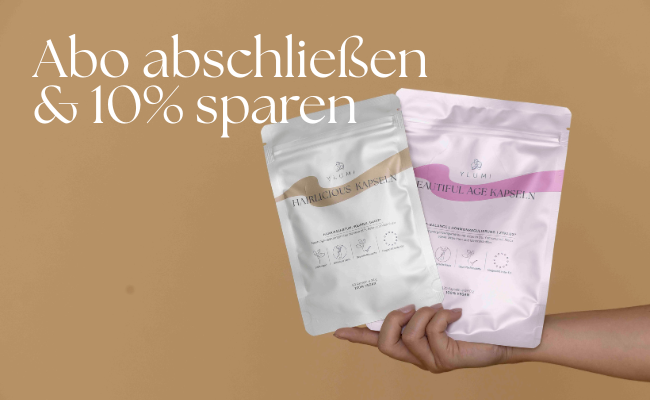
The importance of vitamin D – especially in January and spring
Warm temperatures, a gentle ray of sunshine on our skin, and a feeling of well-being – summer is often the time when we rejoice in the positive effects of the sun on our mood and health. But especially in the winter months, and especially in spring, many people are exposed to less sunlight. This blog post explains why taking vitamin D is so essential now and how we can ensure we get enough.
I. The role of vitamin D in the body
Vitamin D isn't just a simple vitamin—it's a fat-soluble hormone that's crucial for many processes in our body. Its primary function is to regulate the absorption of calcium and phosphorus in the intestines, which in turn is essential for bone and tooth health. Vitamin D also plays a role in the immune system and positively influences muscle and nerve function.
II. Sources of vitamin D
The most important source of vitamin D is sunlight on our skin. UV-B rays from sunlight enable the skin to synthesize vitamin D. However, getting enough sunlight can be difficult during the winter months, especially in regions with low sunlight.
In addition, vitamin D can also be absorbed through food. Fatty fish such as salmon, herring and mackerel, egg yolks, and mushrooms can contribute to a balanced vitamin D supply.
contribute.
III. Why is vitamin D especially important now in spring?
In winter and spring, sunlight exposure is reduced due to shorter days and adverse weather conditions. This can lead to a lack of natural vitamin D production in the skin. Low vitamin D levels have been linked to various health problems, including:
- Weakened immune system: Adequate vitamin D levels are crucial for a well-functioning immune system. During peak cold and flu season, vitamin D can help strengthen the immune system.
- Mood and energy: Vitamin D is often called the "sunshine hormone" because of its role in regulating serotonin, the so-called happiness hormone. A deficiency can lead to mood swings, fatigue, and a lack of energy.
- Maintaining bone health: Because vitamin D plays a key role in calcium absorption, it is essential for maintaining bone health. A deficiency can lead to bone loss and an increased risk of osteoporosis.
IV. How can we ensure we get enough vitamin D?
- Sunlight exposure: Even in winter, it's important to get as much sunlight as possible. Short daily walks outside during midday can help.
- Diet: Include vitamin D-rich foods such as fish, eggs, and mushrooms in your diet. However, keep in mind that the amount of vitamin D in foods is limited.
- Supplements: High-quality vitamin D supplements such as Sunshine Drops are a sensible option to ensure sufficient vitamin D availability, especially when sunlight exposure is limited.
V. The importance of vitamin D supplementation for vegans
Supplementation with vitamin D in combination with K2 is particularly important for vegans who may not be able to benefit sufficiently from natural sources.
Why combine vitamin D and K2?
Vitamin D and K2 work synergistically to promote optimal bone health. Vitamin D plays a key role in calcium absorption, while vitamin K2 ensures that absorbed calcium reaches the bones rather than the arteries. This synergistic effect is especially important for preventing calcification in blood vessels and reducing the risk of cardiovascular disease.
Vitamin D derived from natural lichens is an effective way for vegans to meet their vitamin D needs. It's important to ensure the supplement comes from vegan sources.
Vitamin K2 from natto, a fermented soybean delicacy from Japan, is an excellent natural source of vitamin K2. It may not be to everyone's taste, but for some vegans, it's an acceptable option.
VI. Combination of vitamin D and K2 drops
To maximize the synergistic benefits of vitamin D and K2,
Combination products in drop form, such as our Sunshine Drops, are a convenient and effective option. These drops allow for easy dosing and absorption and are optimally bioavailable.
VII. Conclusion
Vitamin D is a key element for maintaining good health, especially during the winter months. Conscious management of sunlight exposure, a balanced diet, and taking Sunshine Drops can help ensure optimal vitamin D levels.
Sources:
1. Holick MF. Sunlight and vitamin D for bone health and prevention of autoimmune diseases, cancers, and cardiovascular disease. At J Clin Nutr. 2004 Dec;80(6 Suppl):1678S-88S. doi: 10.1093/ajcn/80.6.1678S. PMID: 15585788.
2. Ross AC, Manson JE, Abrams SA, et al. The 2011 report on dietary reference intakes for calcium and vitamin D from the Institute of Medicine: what physicians need to know. J Clin Endocrinol Metab. 2011 Jan;96(1):53-8. doi: 10.1210/jc.2010-2704. PMID: 21118827.
3. Knapen MHJ, Braam LAJLM, Drummen NE, Bekers O, Hoeks APG, Vermeer C. Menaquinone-7 supplementation improves arterial stiffness in healthy postmenopausal women. Thromb Haemost. 2015 May;113(5):1135-44. doi: 10.1160/TH14-08-0675. Epub 2015 Feb 19. PMID: 25694037.
4. Armas LAG, Hollis BW, Heaney RP. Vitamin D2 is much less effective than vitamin D3 in humans. J Clin Endocrinol Metab. 2004 Nov;89(11):5387-91. doi: 10.1210/jc.2004-0360. PMID: 15531486.




